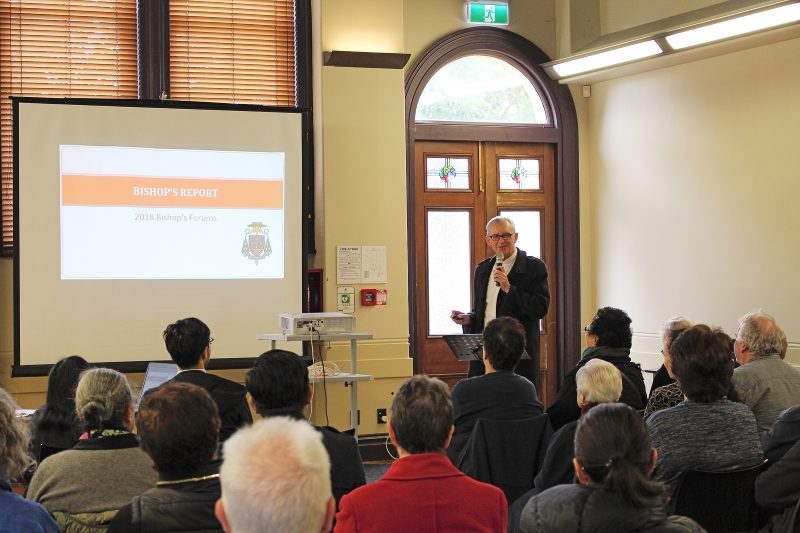Catholic migrant communities in Auckland diocese have been telling their bishop about their fears for their children growing up in secular New Zealand. Bishop Patrick Dunn shared a couple of examples of this during a “bishop’s forum” at St Columba Centre in Ponsonby on May 27, one of several such events in the diocese this year.
“I was out in the Korean parish last year and some of the people said we are really worried about our young people growing up in secular New Zealand,” Bishop Dunn said.
“Samoan families very worried about what is happening with their children growing up in secular New Zealand,” he added.
Many “missionary” priests who arrive from overseas get a shock when they experience New Zealand’s secular society, the bishop said.
“Sometimes they say that ‘I thought it was more of a Christian country’.”
At the forum, the bishop shared some of the data about the 92 priests in parish ministry in Auckland diocese in April. Only 32 of these were born in New Zealand, while 17 were born in India, 12 in the Philippines, 12 in other Pacific states and 19 in “other”. Of the 92, 51 were diocesan priests and 41 religious.
“We are very dependent and grateful for a number of religious priests working in the diocese,” the bishop noted, but he said more diocesan priests are needed. Auckland diocese currently has six seminarians with two to be ordained priests in August and another to be ordained deacon in September.
The bishop also gave the forum an update on a discernment process concerning the diaconate in Auckland diocese.
“We have now had several years of the lived experience of deacons. “We are trying to discern, and we will continue during this year in a whole lot of forums, discerning do we go ahead with looking for more deacons . . . or are there other forms of pastoral leadership we need to consider. In the North they said, no, we prefer to have katekita (catechists).”
But Bishop Dunn also noted the big question is “how do we stem the Kiwi drift” in the Catholic Church in Auckland — by which he meant the dwindling presence of New Zealanders of European ethnicity who go to Sunday Mass.
At the Auckland youth synod in April, the bishop was struck by the very small presence of “Pakeha” young people.
“It affects all our families, all of us, we have got brothers and sisters or children or grandchildren or nephews and nieces or whatever, raised in the bosom of the Church and now drifting.
“This is a great missionary challenge, for the Church, secular society. All around the world, great minds, passionate hearts, are trying to address this issue.”
He acknowledged the growing number of people who say they are spiritual but not religious, adding that these are also a “big missionary challenge”.
Bishop Dunn told the forum of the process being undertaken for reviewing progress on Auckland diocese’s current pastoral plan and for imagining and planning the way forward.
In the next stage in the pastoral plan, “we have to take on board stuff that is coming from our youth synod and I guess the leadership Pope Francis is giving with the synod topic (Young people, faith and vocational discernment) coming up in October”.
One of the things Bishop Dunn would like parishes to consider is how to better cater for those whose work or study commitments mean they can’t get to daily Mass.
Are there possibilities for fellowship or worship in weekday evenings, as some other evangelical churches have successfully implemented, he asked.
Other topics he spoke about at the forum included the Royal Commission into Historic Abuse in State Care, and safeguarding children in church settings.

This is the million dollar question isn’t it? This wasn’t the plan was it? We were supposed to go out and baptize the World and perhaps it’s baptized us.
So where are the Pakeha/Palangi/European Catholics? Where are all the Pakeha younger than 50? Where are the battalions of school alumni since 1970? Where are your grand-children?
Another interesting question is what will be changed or adopted by the institutional Kiwi Church to prevent the same loss in the new immigrant communities over the next 30-60 years?
What will be the ‘discerning’ ‘imagining’ by the strategic working groups of 2050 when there are as many participating Filipinos, South American, Indian, African, and Asian Catholics in thirty years as there are current Pakeha Catholics in 2019?
Anyone who has used Google maps and GPS knows that movement and progress is not the same as reaching the destination. Sometimes Google Maps-GPS leads you down a dead-end, while all the time producing interesting, distracting, and encouraging commentary.
If we really are a humble, listening Church then we might do well to turn the map around. We could be still, we could watch, and we could listen to what the new immigrant communities do and say compared to what Kiwi Catholics don’t do, don’t say, and have discarded over the last 50-60 years.